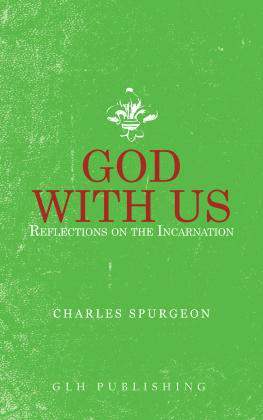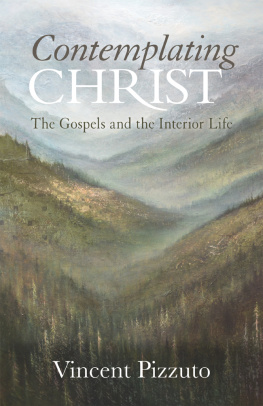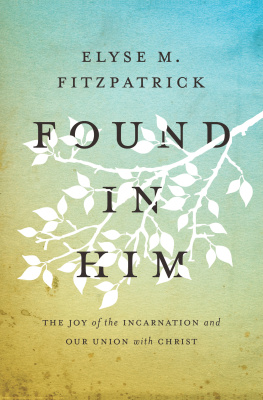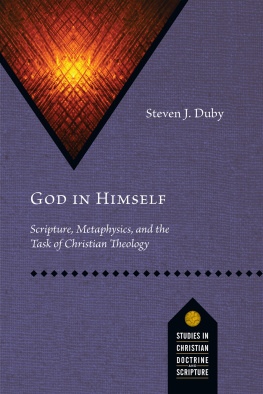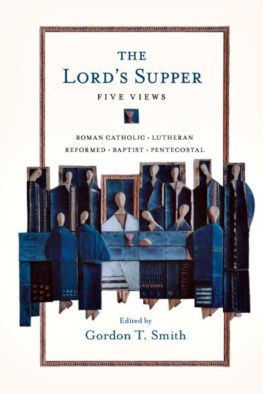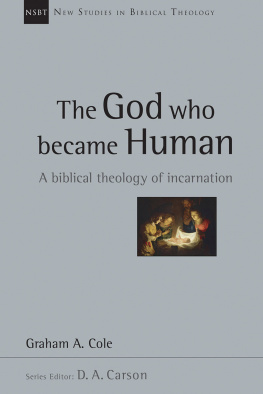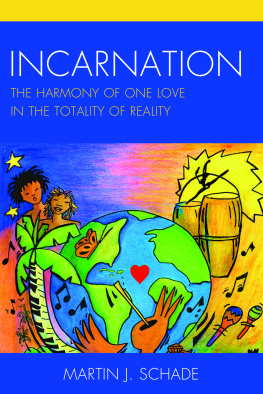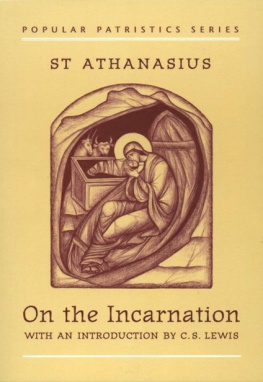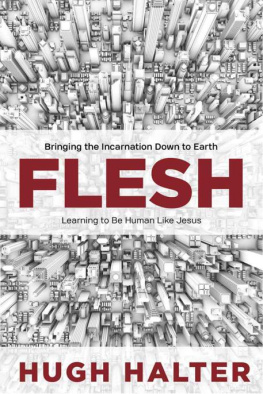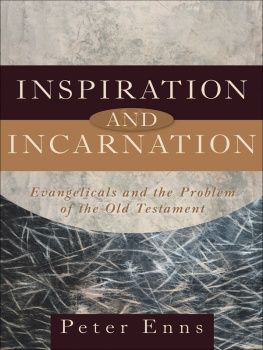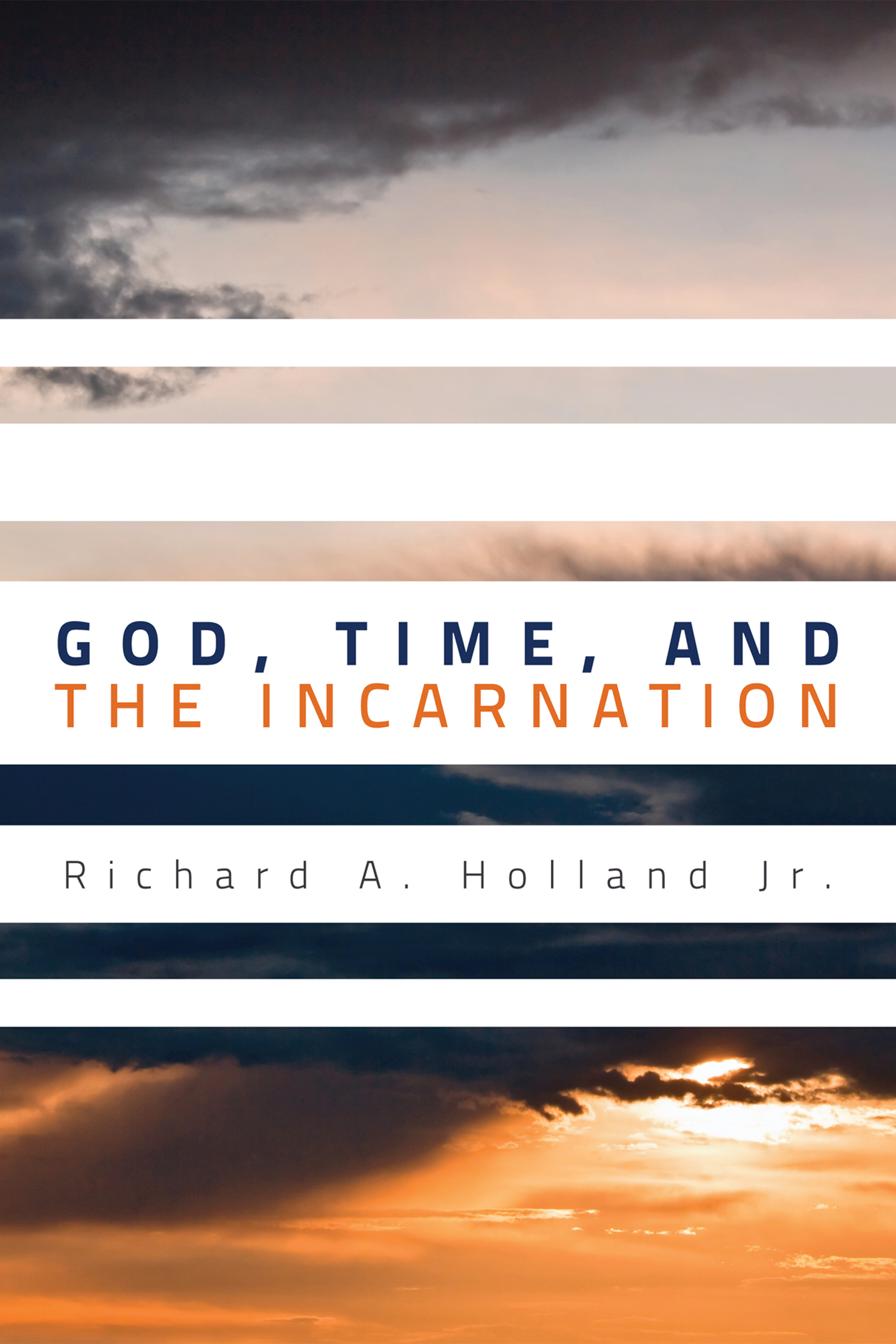Acknowledgments
A project of this scope bears the marks of many. On each page is found encouragement from friends and family, challenges from colleagues, and guidance from mentors. Without the contribution and influence of countless people in my life, I would not have even been able to begin this book, let alone bring it to completion. Although there are many who deserve recognition for the support they have provided for me, space here will not be sufficient to mention them all.
I owe a special word of thanks to my mentor and teacher Dr. Bruce Little. It was Dr. Little who first heightened my interest in Philosophy and Philosophical Theology when I was working on my MDiv degree; and it was his continued influence that eventually led me to study on the PhD level. As he does with all of his students, Dr. Little pushed me hard and demanded nothing but the best work from me. He was relentless and required far more than what the academic program required; and he gave far more to me than his job description required. He has devoted himself to making me a better student; and he has inspired me to become a better theologian, a better philosopher, and a better person.
I owe a word of thanks to Dr. Garrett J. DeWeese and Dr. Steven W. Ladd, who provided helpful advice and guidance as I developed earlier versions of the arguments presented in this book. I also must thank my faithful friends and colleagues Dr. John D. Wilsey and Dr. James K. Dew Jr. John has provided both encouragement and helpful adviceacademic, personal, and professionaland has provided keen insights as I worked on this project. Jamie also has been a constant source of encouragement. He has continually provided trustworthy and reliable advice, and his insights into the substance of this book have been invaluable.
I also must thank my dear wife Larissa, without whose love, devotion, and extraordinary patience this project would not have been possible. Over the past fifteen years of marriage, she has put up with late nights, long commutes, difficult moves, inconvenient schedules, and uncertainty about the future; all the while displaying the grace and charm fitting a woman of God. She has sacrificed more than anyone should be asked to sacrifice, and has given more than anyone should be asked to give. She has provided for me a peaceful, loving home and four beautiful children, whom she has taught to love their father. She has encouraged me to accomplish much, and to dream for more; and many times it was her confidence in me that kept me going when I wanted to quit. And so I thank my wife for her unending love and affection, her encouragement, and her unwavering support.
Above all I give thanks and praise to God who rescued me many years ago, and whose grace and mercy have followed me ever since. It is through the natural abilities he has given me, and the supernatural grace he has lavished upon me that I have been able to complete this project.
Introduction
F rom the earliest days of Christian history the consensus opinion among theologians has been that God enjoys a timelessly eternal existence. Those comprising this majority have asserted that God is atemporalthat he does not experience temporal sequence or succession of any kind. This assertion has been founded on theological and philosophical inquiry into the nature of Gods existenceinquiry that was often prompted by various challenges brought forth. Augustines development of Gods relation to time, for example, arises from his consideration of the question, What was God doing before He made heaven and earth?
The view held by Augustine and Boethiusthat Gods existence is atemporalquickly became the accepted model, with notable theologians from Anselm and Aquinas, to many of the Reformers, to Friedrich Schleiermacher all defending the atemporal view. In the works defending the classical atemporal view, the contemporary arguments typically follow those first made by Augustine and Boethius.
The arguments and definitions laid down by the two early proponents of the doctrine of Gods timelessness share some common features. One key similarity is the emphasis on God experiencing the whole of his life at once, with no passage and no temporal relation of one part of his life to another. In Book XI of his Confessions , Augustine argues that the eternity of God is such that it has no temporal relations such that there is no past, no passage, and no future, but that all things are equally present. He writes that in the Eternal nothing passeth away, but that the whole is present. In Book 5 of his Consolation , Boethius goes on to contrast that which is eternal from that which is in time; and he concludes that while time passes away, Gods eternity is always wholly present.
Further, the idea of immutability also plays a key role in what is now known as the classical atemporal position. A strong sense of immutability is logically connected to Boethiuss argument. If God experiences the fullness of his life at once, without passage of any kind, it would follow that God is necessarily immutable, by virtue of his timelessness. This connection is found also in Augustines argument in The Trinity . He argues that to refer to God as eternal is the same as to refer to him as unchangeable. Making the case, Augustine writes, His immortality is genuine immortality, as in his nature there is no change. But that is also genuine eternity by which God is unchangeable, without beginning, without end, and consequently incorruptible. Therefore one and the same thing is being said, whether you say God is eternal or immortal or incorruptible or unchangeable. So these two conceptsthe fullness of the Divine life and Gods immutabilityare commonly tied together in atemporal models.
Contemporary defenders of the classical view generally invoke these main features in their arguments. Stump and Kretzmann, for example, use Boethiuss definition of eternity to develop their model of divine interaction with the world. In their often quoted and highly influential article Eternity, Stump and Kretzmann rely heavily on Boethius, and devote a significant portion of their essay to expounding Boethiuss conception of eternity. These four authors are representative of the contemporary defense of the classical atemporal view.
Some contemporary arguments, however, have challenged the traditional view that God is timeless. During the past thirty years, a body of literature has developed among Christian philosophical theologians that challenges the classical formulation of Gods relation to time. These authors have suggested, as an alternative, the thesis that God does experience a kind of temporal existence. This contemporary divergence from the classical position has spawned a debate on Gods relation to time; and my intent in this work is to make a contribution to the ongoing discussion.
Purpose of this Work
The purpose of this work is twofold: to examine Gods relation to time, and to offer a critical evaluation of traditional atemporal models and contemporary temporal models in light of the Christian doctrine of the Incarnation of Christ. I will argue that the Incarnation of Christ indicates that God experiences temporal sequence in his existence.
In order to accomplish this purpose, my argument is developed in three main points of focus. First, it reviews the history of the debate within Christianity from Augustine to the present, highlighting the development of various models consistent with the classical atemporal view. Second, it asserts the central importance of the Incarnation for Christian theology, and provides a theological evaluation of prominent temporal and atemporal models in light of this doctrine. Finally, it will provide a philosophical model for how God experiences temporal sequence in his existence based on the Incarnation of God the Son. In each phase of the presentation, special attention is given to how the various models of Gods relation to time account for the Incarnation, both as Christ entered the world, and as he remains incarnate in a post-resurrection transformed state. Thus, I am attempting to offer a viable solution to the debate by using the Incarnation as the lens through which Gods relation to time is properly viewed.


